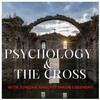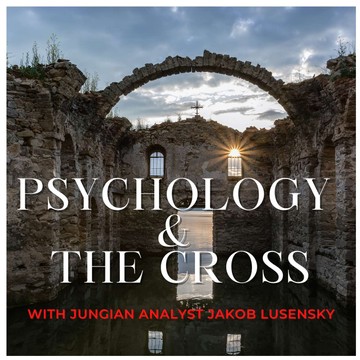

Psychology & The Cross
Jungian Analyst Jakob Lusensky
Jungian Analyst Jakob Lusensky engages in dialogues and research at the intersection of depth psychology, and Christianity for the purpose of individual and cultural transformation.
Join the conversation on our Substack page.
https://open.substack.com/pub/centerofthecross
Join the conversation on our Substack page.
https://open.substack.com/pub/centerofthecross
Episodes
Mentioned books

Nov 28, 2021 • 33min
S1 Secular Christ | New podcast series with Sean McGrath
For the coming four Sundays of Advent ‘Psychology & The Cross’ will take a break and give room for a new podcast series that we named 'Secular Christ'. The spark for this initiative came from a conversation I had in episode 3 with Theology & Philosophy professor and former monk Dr Sean J McGrath. In it, he spoke of the limits of psychology and the role of Christian faith in socio-political transformation. So if psychology “is not the end of the road”, what’s next?

Nov 25, 2021 • 59sec
New podcast: Secular Christ with Sean McGrath (Trailer)
A trailer to the podcast Secular Christ with Dr. Sean J McGrath.Send in a voice message with your questions or thoughts: https://anchor.fm/secular-christ/message

Nov 21, 2021 • 3min
An enormous turd: Jung's vision at the Basel Cathedral
Jung's description of his schoolboy vision of God landing an enormous turd on the Basel Cathedral. The excerpts are from the biography 'Memories, dreams and reflections'.For the full text and Jung's own interpretation of this event, download the biography on this link.

Nov 14, 2021 • 55min
E7 Jung as a prophet for the 21st century with David Tacey
“We can not have a world of individuated individuals without having also a developed and individuated community. That is where I think Christianity has a lot to teach everybody, including Jungians.”Episode description: David Tacey is a Jungian scholar and interdisciplinary researcher whose teaching and writing encompasses the areas of psychoanalysis, religion, spirituality studies, and literary approaches to psychology. In this episode, David speaks of his analysis with the late James Hillman, and about his former mentor's disdain towards Christianity and the Jungian Self. He addresses the importance of reading the bible symbolically rather than literally, the necessary death and rebirth of Christianity, and how Jungian individuation needs to be complemented with a Christian social ethos. Finally, we discuss Jung’s role as a prophet for the 21st century, in dreaming the Christian story onward. Subscribe on Youtube.Music played in this episode licensed under creativecommons.org: 'Ketsa - No light without darkness, 'Siddhartha Corsus - Constellations.'

Nov 3, 2021 • 2min
Do you believe in God? I don't need to believe, I know. (Audio clip from Jung's 1959 BBC interview)
An audio clip from John Freeman's 'Face to Face' (BBC) interview at Jung's house at Küsnach, in March 1959. It was broadcast in Great Britain on October 22, 1959.Watch the full video here: https://www.youtube.com/watch?v=2AMu-G51yTY

Oct 25, 2021 • 2min
Psalm 2 - A musical interlude
More psalms and music on: https://soundcloud.com/psychology-and-the-cross/

Oct 13, 2021 • 50min
E6 The white raven: C.G Jung & Victor White with Ann Conrad Lammers
What does it mean for Jung to be a Christian? Those symbols of the Christian church continued to matter for him deeply. The crucifixion remained a central image for his thinking, and the idea of resurrection, well, he reframed it in terms of winning through to a resurrected body when one is still alive. But that is the kind of language he would not have used if he had abandoned the Christian mythology, the Christian story.Episode description:Ann Conrad Lammers is a Jungian scholar who has worked and written at the crossroads of theology and psychology for the last forty years. Her doctoral work at Yale University led to the book In God’s Shadow: The Collaboration of Victor White and C.G. Jung, and she is the editor of their correspondence.In this episode, Ann guides us through the creative and complex relationship between C.G. Jung and Dominican priest Victor White: a foundational relationship for Jung, and crucial to a deeper understanding of how Jungian psychology relates to Christianity.With read excerpts of the Jung–White correspondence as a backdrop, Ann shares her view on Jung as a Christian, the proposed idea of Jung as a therapist of an ailing Christian tradition, Jung’s relativized Christ, and the potential dangers of an Imitatio Jung. A special thank you to Jungian analyst Paul Brutsche for his beautiful Basel accent in recording the voiceover of C.G. Jung.BiographyAnn Conrad Lammers is co-editor of The Jung–White Letters, The Jung–Kirsch Letters, as well as editor and cotranslator of Erich Neumann’s two-volume work, The Roots of Jewish Consciousness. She is currently English-language editor and assistant translator for a selection of Emma Jung’s previously unpublished writings and artworks. Subscribe on Youtube: https://bit.ly/3sXloJbMusic played in this episode"Dawns Dew" and "Mind" by ketsa.uk. Licensed under creativecommons.org by NC-ND 4.0.

Sep 24, 2021 • 2min
A letter from C.G Jung to Hermann von Keyserling, 1928
A letter from C.G Jung To Count Hermann von Keyserling, Küsnacht, 2 January 1928"Dear Count,Your return to yourself, enforced by illness, is on the right track and is something I have wished and expected for you. You identify with the eternally creative, restless, and ruthless god in yourself, therefore you see through everything personal— a tremendous fate which it would be ridiculous either to praise or to censure!I was compelled to respect Nietzsche’s Amor fati until I had my fill of it, then I built a little house way out in the country near the mountains and carved an inscription on the wall: Philemonis sacrum— Fausti poenitentia, and “ dis-identified” myself with the god. I have never regretted this doubtless very unholy act. By temperament I despise the “ personal,” any kind of “ togetherness,” but it is so strong a force, this whole crushing unspiritual weight of the earth, that I fear it. It can rouse my body to revolt against the spirit so that before reaching the zenith of my flight I fall lamed to earth. That is the danger you too must reckon with. It is also the fear that prevents our friend X from flying. He can be nothing else but intellectual. You have paid a salutary tribute to the earth with your illness. Let’s hope your gods will be equally gracious to you next time!With best wishes for the New Year,Yours sincerely, C.G Jung"Jung ~Carl Jung, Letters Vol. I, Pages 49-50

Sep 14, 2021 • 11min
The 1 millimeter: Jung's dream about his father
In this bonus material to episode four of Psychology and the Cross, you get to hear the full dream of C.G Jung about how his dream-father leads him to the "highest presence". A dream that Jung made his own interpretation of but which has also been analyzed by other scholars such as Wolfgang Giegerich. The dream was first shared by Jung in the Aniela Jaffé biography 'Memories, dreams, reflections'.Reading recommendations:A. Jaffé & C.G Jung, Memories, dreams, reflections (Internet Archive)W. Giegerich, Jung’s Millimeter - Feigned Submission (Article)

Sep 8, 2021 • 8min
E5x Jung's Red Book as an anti-Zarathustra with Paul Bishop
What do we do if God is dead? British scholar, Paul Bishop examines the links and relationships between Nietzsche's Zarathustra and C.G Jung's Red Book. Understanding Jung's visionary work as an anti-Zarathustra, replying to Nietzsche that, God is not dead, “Er ist lebendiger denn je.” He is more alive than ever.Subscribe on Youtube:https://bit.ly/3sXloJbRecommended reading: Shamdasani, Hillman (2013) Lament of the Dead : Psychology after Jung's Red Book


